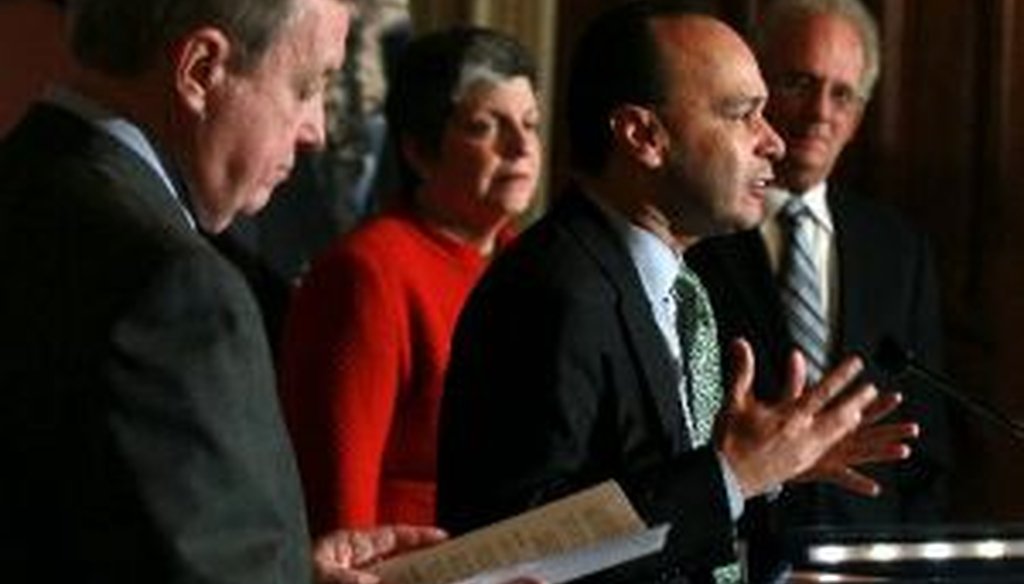Stand up for the facts!
Our only agenda is to publish the truth so you can be an informed participant in democracy.
We need your help.
I would like to contribute

U.S. Rep. Luis Gutierrez, D-Ill., makes a pitch for the Development, Relief and Education for Alien Minors Act, also known as DREAM Act, at a press conference on Capitol Hill December 8, 2010.
Republican Congressman Steve King said the term "Dreamers" is a euphemism in the immigration debate and includes even people who haul drugs across the border.
In an attention-getting CNN interview, King said he doesn’t favor giving protected status to "Dreamers," the nickname from immigration advocates for young people brought to the United States as children and who remain here illegally.
The term itself, King said, is "sympathetic."
Alisyn Camerota, New Day co-host, asked King on Dec. 8 if Dreamers would be deported under the incoming administration, noting that President-elect Donald Trump recently sounded more open to their cause in an interview with Time, when he said that something would be worked out.
King said he expected Trump to "cancel" a program that defers deportation for the so-called Dreamers, and that the group also includes people 37 and older and "some awfully bad people."
Sign up for PolitiFact texts
Camerota asked him for an example of "terrible Dreamers."
King: "Well, I'll just say this. I've spent a fair amount of time down at the border. I've been down there and helped arrest people that are smuggling drugs in. I have watched as these packs of marijuana are on the backs of young men that are walking across the border. They're hauling an average of about 65 pounds and some of them, everyday they take another load. They would qualify, too."
Camerota: "Okay, so you think that those drug traffickers are what are referred to as the Dreamers who were brought here against their will as minors and now go to school here and have jobs?
King: "Wait, wait, wait. This definition of about against their will, that's a made-up term. Did any of those little kids say I didn't want to come here or did any one of them that were turned in came in the day before they turned 18? They qualify, too."
King did not clarify to Camerota what he meant, but his answer suggested he believes some Dreamers are smuggling drugs into the country and that they also qualify for the deportation relief program, Deferred Action for Childhood Arrivals (DACA). We reached out to King’s office for clarification but did not get a response.
We wanted to lay out the application requirements for the deportation relief program, revisit the history behind Obama’s executive actions and look ahead to new strategies catering to the next administration.
DACA rules exclude applicants convicted of various offenses
Despite what the representative from Iowa said, someone caught "hauling an average of about 65 pounds" of marijuana across the border likely would not qualify for DACA or for other programs meant to protect young immigrants in the country illegally.
In terms of criminal history, U.S. Citizenship and Immigration Services says immigrants will not be considered if they have been convicted of:
- a felony;
- significant misdemeanor (including drug distribution or trafficking); or
- three or more misdemeanors "not occurring on the same date and not arising out of the same act, omission, or scheme of misconduct."
Based on the program’s guidelines, "felony convictions for drug trafficking and drug trafficking crimes that qualify as ‘significant misdemeanors’ would generally bar an individual from DACA," said Shoba Sivaprasad Wadhia, a law professor and director of the Center for Immigrants’ Rights Clinic at Pennsylvania State University.
Someone actually caught and convicted smuggling loads of pot would not make it through the DACA process.
"Undocumented immigrants with serious criminal convictions are not eligible for DACA. That is clear," added Kevin Johnson, an immigration expert and law professor at the University of California, Davis.
What King might be saying is that drug smugglers without convictions have used the program, Johnson said, though Johnson has not seen any evidence of that.
About half of DACA approvals are 19 or younger
DACA also requires that applicants be younger than 31 years old as of June 15, 2012. So the oldest someone can currently be to apply is 35 (immigrants who turned 31 after June 15, 2012).
Applicants also have to prove the following and meet other requirements:
- That they came to the United States before turning 16;
- They lived here continuously since June 15, 2007;
- They are in school or graduated high school or have a GED, or are an honorably discharged veteran of the Coast Guard or Armed Forces of the United States.
King mentioned that some Dreamers are in their late 30s and older. About 2 percent of recipients were in their 30s, based on 2014 USCIS data of requests accepted and approved from August 2012 to September 2013.
In that period, about 580,000 requests were accepted and about 514,800 were approved. About half of them were 19 or younger.
Here’s an age breakdown of who was approved:
- 19 years old and under: 260,800
- 20 to 24 years old: 169,000
- 25 to 29 years old: 74,600
- 30 and older: 10,500
(Totals may not add up due to rounding)
An updated report breaking down the ages of additional applicants has not been released.
As of June 30, 2016, about 742,000 immigrants had been approved for DACA.
The DREAM Act goes back 15 years
"Dreamers" is a nickname initially used for potential beneficiaries of the Development, Relief, and Education for Alien Minors Act (DREAM Act) — legislation designed to help immigrants who came to the United States when they were children but are living in the country without legal permission.
The term is now widely used to also describe young immigrants who benefit from other relief programs, such as DACA.
The DREAM Act was first introduced in the Senate in 2001, seeking to amend immigration laws to allow states to "determine State residency for higher education purposes and to authorize the cancellation of removal and adjustment of status of certain alien college-bound students who are long term United States residents."
Immigration advocates argue undocumented immigrants who came here when they were young have grown up identifying and leading lives as Americans. Yet they usually are not allowed to obtain driver’s licenses, pay in-state college tuition, work legally or enjoy other rights and privileges granted to U.S. citizens and lawful permanent residents. (Some individual states allow them to get driver’s licenses or pay in-state tuition.)
Over the years, variations of the DREAM Act have been introduced in the Senate and in the House. All versions have stalled in Congress.
President Barack Obama’s administration in 2012 announced DACA as a way to put a program in place that was like the DREAM Act. The program defers deportation for two years and allows recipients to apply for work permits. DACA status can be renewed, but it does not grant permanent lawful status.
In 2012, Pew Research Center estimated there were 4.4 million unauthorized immigrants ages 30 and under, and that up to 1.7 million were potentially eligible for DACA.
Obama announced new programs in 2014 to offer deportation relief to more people — an expanded version of DACA lifting an age cap for applicants, and another covering parents of U.S. citizens and lawful permanent residents. Those programs are on hold after a Supreme Court deadlock.
Senators pursuing new legislation ahead with incoming administration
After the 2016 election, senators from both parties are again moving for consideration of a bill to help Dreamers.
On Dec. 9, 2016, Sens. Lindsey Graham, R-S.C., and Dick Durbin D-Ill., introduced legislation to protect young undocumented immigrants should Trump eliminate DACA. (Trump promised he would when campaigning for president.)
The Bar Removal of Individuals who Dream and Grow our Economy Act (or BRIDGE Act), would offer temporary relief from deportation and work permits to young immigrants who came the United States when they were children and live here illegally.
The bill was filed for the current Congress and the senators plan to introduce it again in the next Congress, according to Durbin’s office. The new 115th Congress convenes Jan. 3, 2017.
The BRIDGE Act would benefit immigrants who meet DACA requirements.
Applicants "would be required to pay a reasonable fee, be subject to criminal background checks, and meet a number of eligibility criteria indicating that they came to the United States as minors, grew up in this country, have pursued an education, have not committed any serious crimes, and do not pose a threat to our country," according to a press statement from Durbin’s office.
Drug smuggling convictions would bar applicants from benefitting from the BRIDGE Act.
Our Sources
YouTube, Rep. Steve King CNN interview, Dec. 8, 2016
Time, 2016 Person of the Year Donald Trump, December 2016
U.S. Citizenship and Immigration Services, Consideration for Deferred Action for Childhood Arrivals
U.S. Citizenship and Immigration Services, Characteristics of Individuals Requesting and Approved for Deferred Action for Childhood Arrivals (DACA), 2014
U.S. Citizenship and Immigration Services, Number of I-821D,Consideration of Deferred Action for Childhood Arrivals by Fiscal Year, Quarter, Intake, Biometrics and Case Status: 2012-2016, June 30, 2016
Congress.gov, S.3542, introduced Dec. 9, 2011
Congress.gov, S.1291 - DREAM Act, introduced Aug. 1, 2001
Congress.gov, H. R. 1842, introduced May 11, 2011
American Immigration Council, FACT SHEET The DREAM Act, July 13, 2010
Pew Research Center, Up to 1.7 Million Unauthorized Immigrant Youth May Benefit from New Deportation Rules, Aug. 14, 2012
Sen. Dick Durbin press release, Graham, Durbin Announce Bipartisan Bridge Act To Protect Young Individuals From Deportation, Dec. 9, 2016
PolitiFact, Pro-Clinton Super PAC says Trump wants to deport millions, including 'Dreamers,’ Nov. 1, 2016
New York Times, Supreme Court Tie Blocks Obama Immigration Plan, June 23, 2016
Email interview, Kevin Johnson, an immigration expert and law professor at the University of California, Davis, Dec. 9, 2016
Email interview, Shoba Sivaprasad Wadhia, a law professor and director of the Center for Immigrants’ Rights Clinic at Pennsylvania State University, Dec. 9, 2016
Email interview, Jose Magaña-Salgado, managing policy attorney at the Immigrant Legal Resource Center, Dec. 9, 2016




































